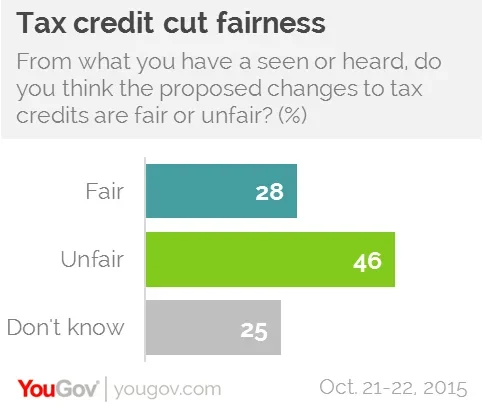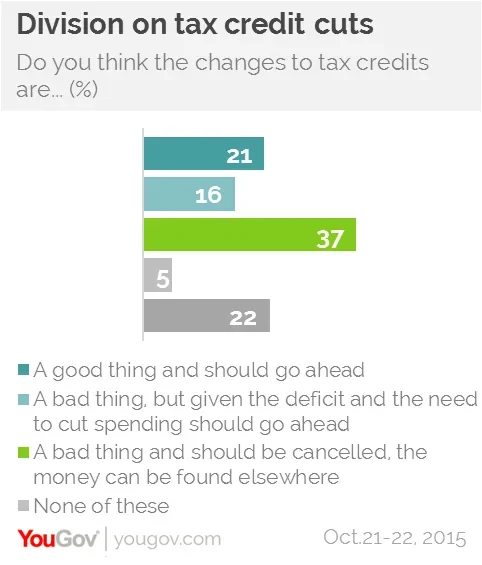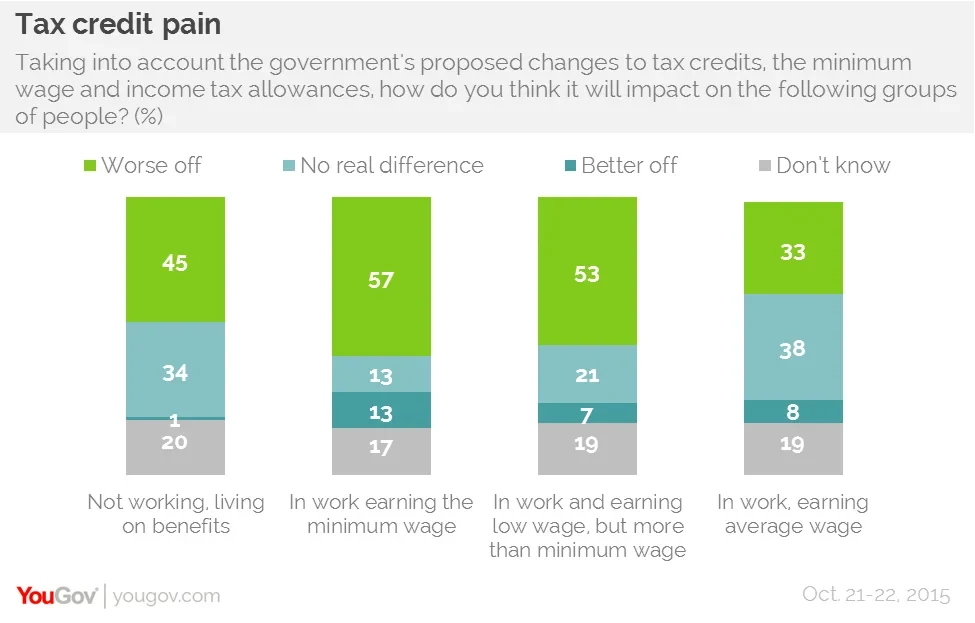British people tend to say the proposed tax credit cuts are unfair and will make large groups of working people worse off – but many still say they’re necessary
Pressure is growing on George Osborne to weaken his stance on tax credit cuts. It’s unlikely the changes will be cancelled entirely, but it’s still possible the final version of the welfare bill could include provisions to soften the blow for the poorest. There are rumours of differences between Number 10 and 11 on this, but a key calculation for George Osborne will be the size of the gap between those voters who really think the cuts are unacceptable, and those who say they are unfair, but nevertheless necessary to slim the deficit and the size of the welfare state.

There is no simple message for George Osborne in YouGov’s latest polling. On balance the tax credit cuts are viewed as unfair, with 46% saying this and only 28% saying they’re fair, but then again only 37% oppose the cuts enough to say they should be cancelled.
Among those who have been following the story very or fairly closely, a group which is slightly more likely to have voted Labour, a majority say they’re unfair (63%). This could mean that as more and more people read the news the tide begins to turn against the cuts, but it could also mean, perhaps more plausibly, that the large group of people who aren’t politically interested are unlikely to strongly oppose the measures.
There is a small but not insignificant group of people (around one in eight, or 13%) that agree the cuts are unfair, but then also say they should go ahead given the size of the deficit and the need to cut spending. The real political calculation is how many of those who aren’t following the story all that closely will fall into this group when they form an opinion.

While 37% say the cuts are bad and should be cancelled, with the money being found elsewhere, an equal proportion of the British public (37%) say the cuts should go ahead, either because they support them wholeheartedly (21%) or because they think they’re bad but necessary to reduce spending (16%).
Nearly one in four Conservative voters (22%) fall into this group, while only 13% oppose the cuts enough to say they should be cancelled. 18% of Labour votes support the cuts, as do 29% of Lib Dems and 46% of UKIP voters.
The Conservative line against the attack that working families on low incomes will lose an average of £1,000 due to the cuts is that increases in the minimum wage and the personal tax threshold will compensate for the changes. This hasn’t washed with the British public however – 57% say that workers on the minimum wage will be made worse off by the cuts, and 53% say the same about those on low wages but above the minimum wage.

Regarding average salary workers, a third (33%) say the cuts will make them worse off but 38% say they will make no real difference.
David Cameron has warned peers considering an attempt to kill off the cuts to “listen very carefully and recognise it is for the House to make final decisions”. The Conservatives do not have a majority in the Lords, and a Lib Dem peer has tabled a “fatal motion” which could cancel the cuts if passed. Around 4.5 million people are eligible to claim tax credits. Under the government’s proposals the threshold above which working tax credits can be claimed will be lowered from £6,420 a year to £3,850 and the rate at which the payments are cut as earnings increase will be sped up.
PA image








